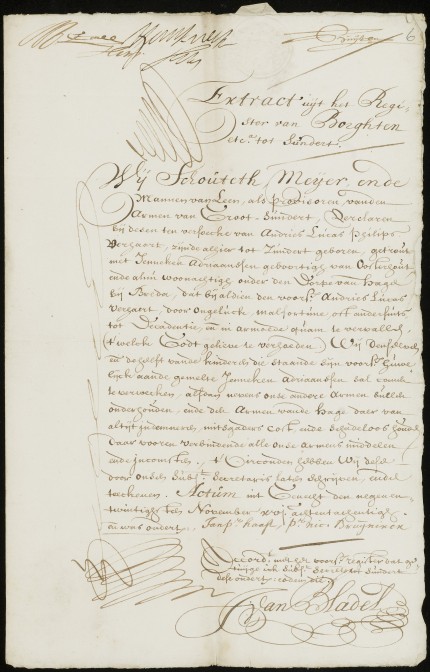Before the mid 1800s, if you wanted to move to a new place, you had to provide proof that you would not be a liability to the town. You would be required to submit a bond letter to the authorities, wherein the poor administration or civil authorities of your previous town declared that they would take care of you if you became poor. These letters were called “borgbrieven” [bond letters] or “akte van indemniteit” [record of indemnity] and can be a wonderful source of information about migration patterns or even about marriages.
Content of a bond letter
Typically, a bond letter contains the following information:
- Name of the person
- Names of the town of origin and destination
- Identity of the organization vouching for the person
- Reason for seeking the letter, e.g. marriage, move to a different place
- Sometimes: other family members moving at the same time
Example: Bond letter for Andries Lucas Philips Verhaart, 1688
As an example, lets review the bond letter for Andries Lucas Philips Verhaart, who received a bond letter on 29 November 1688 from the overseers of the poor administration in Groot-Zundert regarding his move to Princenhage.1
Translation:
Extract from the register of bonds et cetera in Sundert [Zundert] We “schouteth, meijer ende mannen van leen” [approximately: bailiff, administrator and vassals], as overseers of the poor in Groot-Sundert [Groot-Zundert], declare at the request of Andries Lucas Philips Verhaart, being born here in Zundert, married to Jenneken Adriaansen, born in Oosterhout and currently living under the village of Hage [Princenhage] near Breda, that if said Andries Lucas Verhaert, by accident, misfortune or otherwise, falls into decadence and poverty, which we pray God will prevent, we will support him and half of the children that he shall procreate during his marriage to said Jenneken Adriaansen, along with our other poor, and to indemnify the poor of Hage for said expenses forever, for which we pledge the possessions and income of the poor [administration]. To protocol we have had this recorded by the substitute secretary and signed. Recorded in court on twenty-nine November xvic [16 hundred] eighty eight and signed by Jan Pr. Haast, Pr. Nic. Bruijnincx. I, substitute secretary in Sundert testify that this is in accordance with said register, and signed this the same day. [signed] J van Bladel
The bond letter has many interesting pieces of information:
- It gives us Andries’ name as Andries Lucas Philips Verhaart. In this time, people in Brabant often had a string of patronymics. This tells us that Andries is probably a son of Lucas, son of Philips. Other records about Andries may not reveal all these patronymics.
- It tells us that his wife was Jenneken Adriaansen.
- It gives us the place of birth of both Andries (Zundert) and Jenneken (Oosterhout).
- It says that they will take care of Andries and half of his children with Jenneken, if he ever becomes poor. Since Jenneken was not from Groot-Zundert, the poor administration of Groot-Zundert was only responsible for taking care of half the children, and not for taking care of Jenneken.
Jenneken may have received her own bond letter, which is another thing to look for in the incoming bond letters of Princenhage or the outgoing bond letters of Oosterhout.

Zundert. Credits: Dirk Verrijk, collection Rijksmuseum (public domain)
Where to find bond letters
Bond letters are typically found in the administration of the town where a person moved to, either in the administration of the town itself or of the church (if the church took care of the poor). Sometimes, the old town kept copies of outgoing letters too. The records of churches and towns can usually be found in regional archives. Search for the terms borgbrief, borgbrieven or indemniteit in the catalog to find them. Some archives have made bond letters available online in the form of indexes and/of scans, but most have not.
- Poor administration of Groot-Zundert, bond letter for Andries Lucas Philips Verhaart, 29 November 1688, certified copy; Princenhage, incoming bond letters 1686-1698, letter 6; digital image, “Bladeren door Bronnen,” Stadsarchief Breda (http://stadsarchief.breda.nl : accessed 20 August 2015), “Borgbrieven Princenhage ingekomen 1686-1698,” image ARC0441_1866_0011.



A similar certificate is “getuigschrift” or “verhuisbiljet” but I’m not sure what the differences are.
Very interesting post.
I’ve recently learned that in New England in the 17th and 18th c. a custom existed that I think may have had a somewhat similar purpose, though it functioned very differently. If someone moved into a town who appeared not to have the means to support themselves, they would be “warned out.” This meant that if, in the future, they became a financial burden on the community, they would have to go back to the community where they were born. If you were born in that community, however, the town would make sure you were taken care of if you ran into financial difficulties. They took care of their own, in other words, but not “strangers.”
It happened to one of my ancestors who moved with his young wife to a town where neither had any relatives, soon after the American Revolution. As it happened, all their many children were born there, and the couple themselves were buried there, so they appear to have been able to support themselves there without becoming a financial burden to the community.
It would appear that this system could in some cases split families, because the husband and wife could have been born in different towns, as my ancestors were, and the children in yet different towns, if the family had moved. If later forced back to their birthplaces, because the “warned out” clause was invoked when the family got into financial trouble, the family could end up in several different places. I have no idea how often this clause was actually invoked. I would think it would depend on not just whether you got into financial difficulties, but whether you offended legal officials as well.
The way you describe the Dutch system, if everyone who moved had to get the papers, there wouldn’t be anything quite so arbitrary about it.
Interesting indeed…a form of that was used in the U. S. during the 1930’s “Great Depression”…my parents and 3 year old brother left Idaho to migrate to Los Angeles CA area. At the Arizona-California border, they were turning people away who lacked some proof of income or care. Fortunately, forewarned, they had a letter from my father’s uncle in L. A. that he could and would take financial responsibility for them…